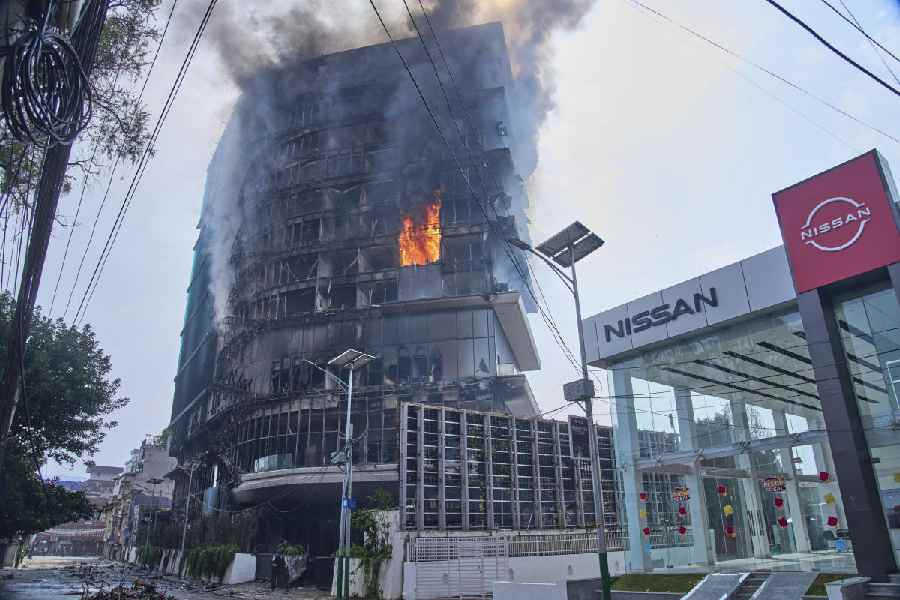The Nepal uprising has created uncertainty for hundreds of bronze artisans from Bengal, particularly those who specialise in making exportable singing bowls, as they are currently confined to their workplaces in various parts of the Himalayan country, including capital Kathmandu.
“My son and I have been in Kathmandu for the past five years. We work in a factory that makes singing bowls that are exported. Since the unrest began, we have been confined inside our factory. We don’t know when normality will return and when we can go back home,” Bipadtaran Karmakar, originally from Lalbajar village under Bankura’s Hirbandh, told The Telegraph over the phone via WhatsApp voice call.
A singing bowl is a type of idiophone or musical instrument that produces a sustained, resonating sound when struck or circled with a wooden mallet, creating vibrations that can be felt and heard. These bowls, often made from metal alloys like bronze or crystal, are used in sound healing and meditation to promote relaxation, reduce stress and potentially heal various physical and mental health conditions. Historically used by Tibetan monks, they are now widely employed in sound therapy, yoga and wellness practices.
“We have nothing to do with the unrest, but Kathmandu has been taken over by the Army, and everyone has to explain their movements,” he added.
Bipadtaran is one of nearly 1,000 bronze artisans from different villages in Bankura, particularly from the Hirbandh area, who have been working in multiple factories in Nepal’s towns. They are hired for their expertise in making singing bowls, which are exported to China, Tibet, Singapore and Thailand.
There are around 21 villages in the Purulia and Bankura districts, where hundreds of artisans make singing bowls, other musical instruments, and utensils from bronze or other alloys.
These bronze artisans are organised under the Bankura Purulia Kansa Petai Unnayan Samiti.
The welfare society claims at least 1,000 artisans are currently working in Nepal.
“We are worried about them. They go there because they earn better,” said Subodh Kumar Karmakar, society president.
Bhabataran Karmakar, the deputy chief of Maliyan gram panchayat, said almost every family in Lalbadh, Maliyan and Shyamnagar villages has members working in Nepal.
“My elder brother and nephew are also in Nepal. I spoke to them last night (Tuesday). They can’t leave their factories in Kathmandu because of the unrest,” he said.
Most artisans' kin in Bankura said they wanted the situation in Nepal to return to normal fast, as migrants' remittances were vital.
“An artisan in Bankura can earn ₹6,000–8,000, while in Nepal they earn ₹25,000–30,000. It’s a huge difference, and that’s why people go there,” said Birendra Karmakar, a labour contractor in Bankura.
Hundreds of gold jewellery artisans from Hooghly and West Midnapore also work in Nepal.
Sourabh Maji, a gold ornament artisan currently in Nepalganj, near the Uttar Pradesh border, said the unrest has had less impact in his area. Maji, who hails from Dongol village in Hooghly's Arambagh, however, said they were worried. “If Kathmandu markets don’t reopen fast, our products won’t be sold and our income will be hurt,” he said.
Samirul Islam, who chairs the West Bengal Migrant Workers Welfare Board, said: “Our chief minister has already sent messages to tourists and others stranded in Nepal. Since it is another country, we can't act independently. But if we get to know about the plight of any migrant worker from Bengal (in Nepal), we will do our best to help."










